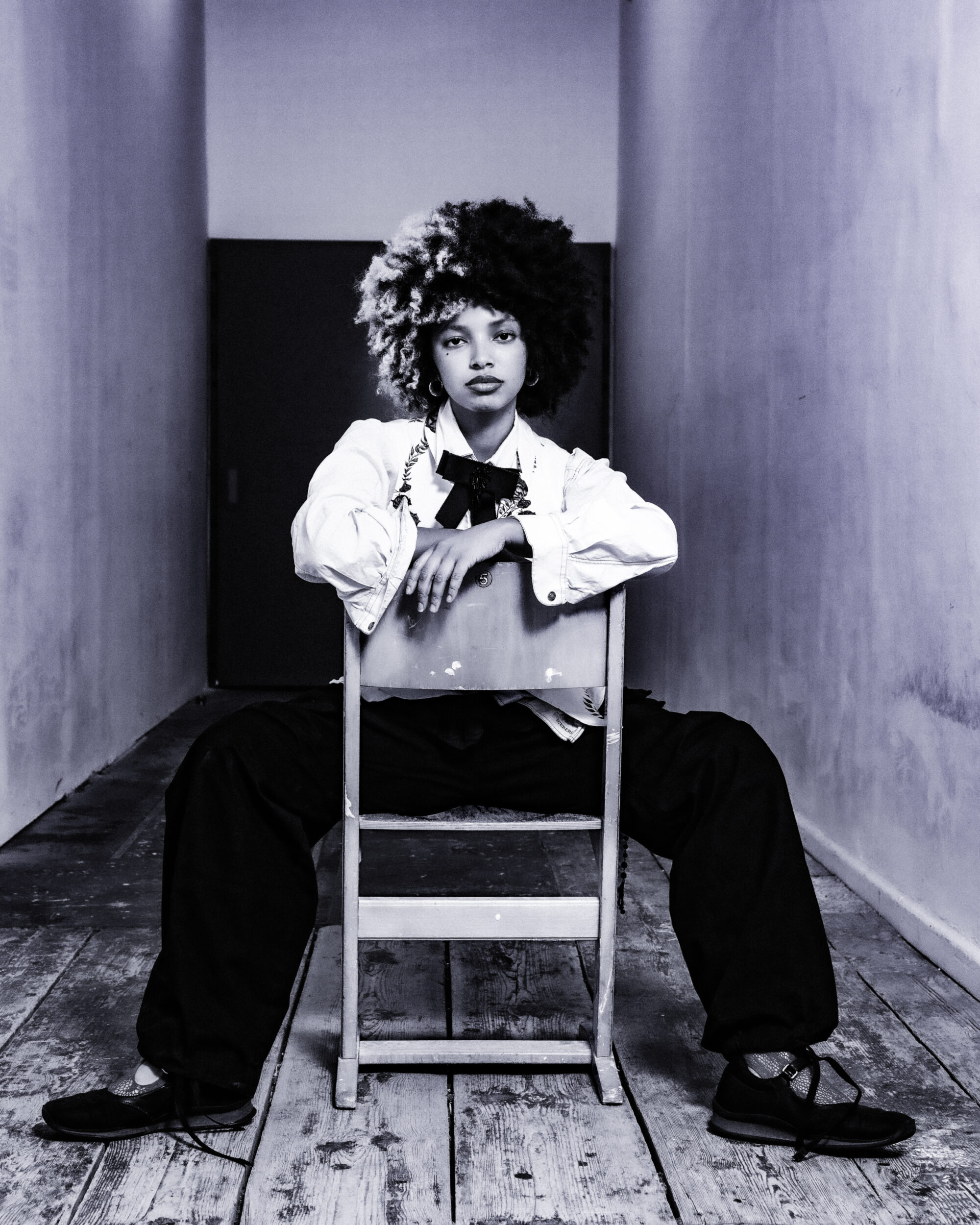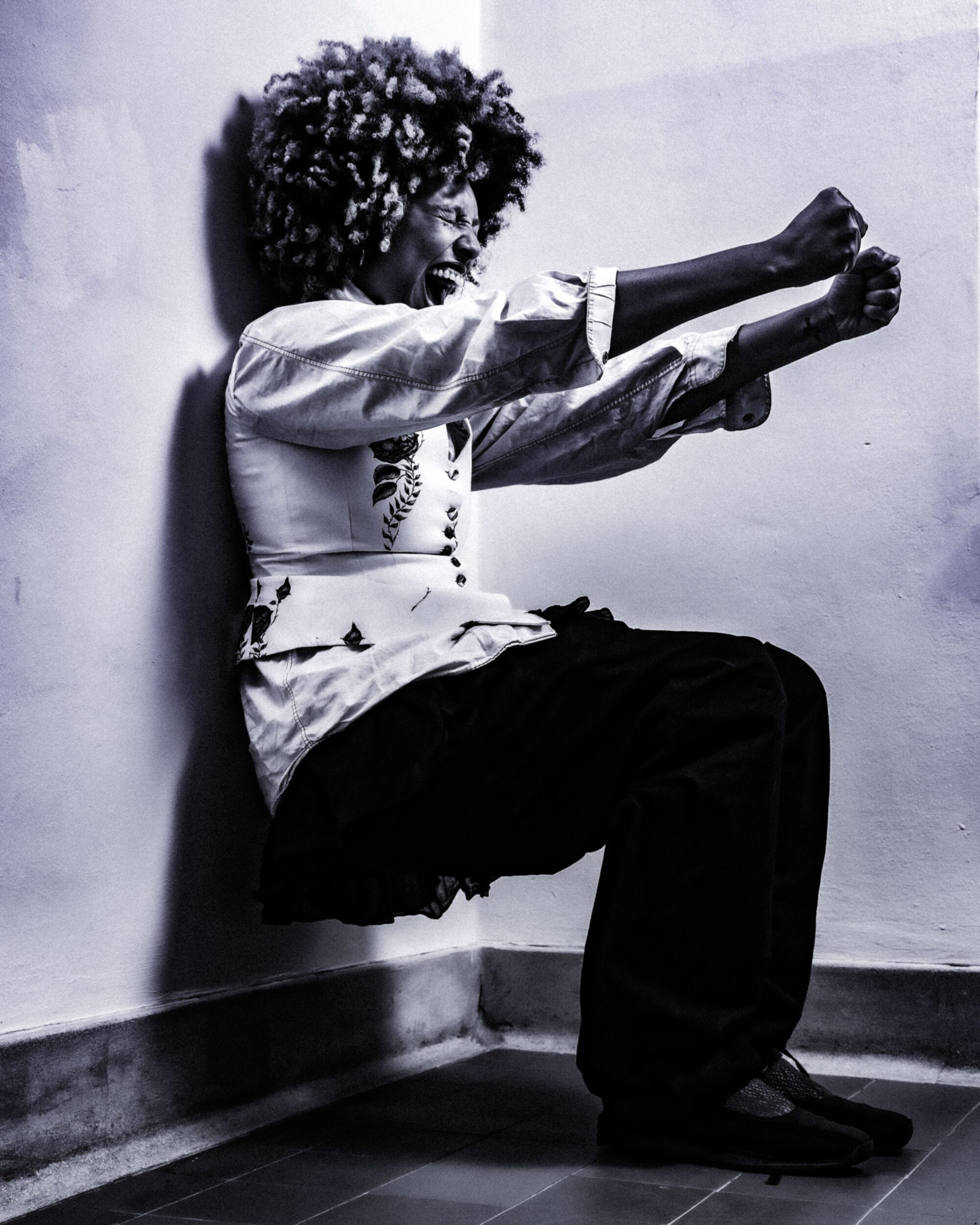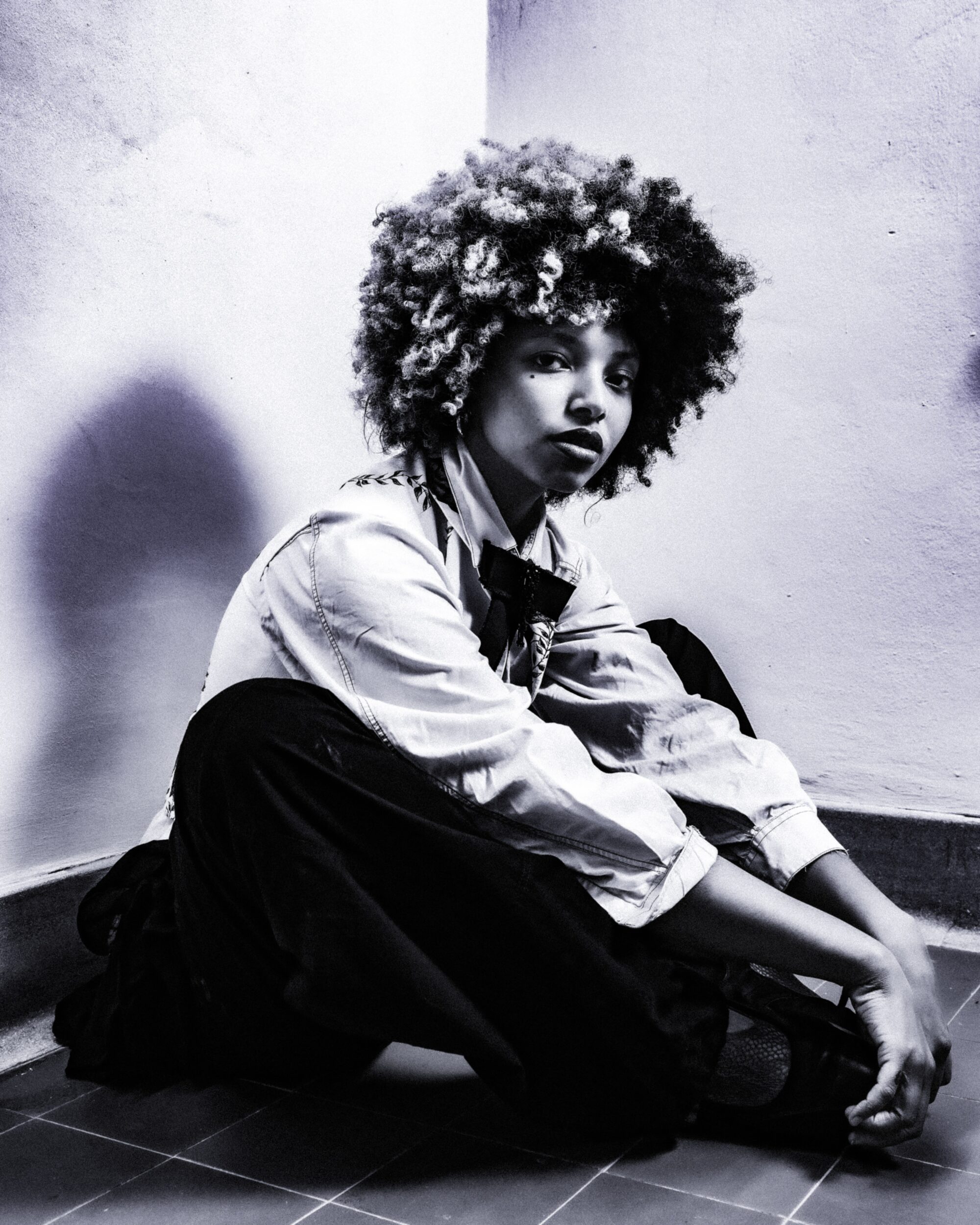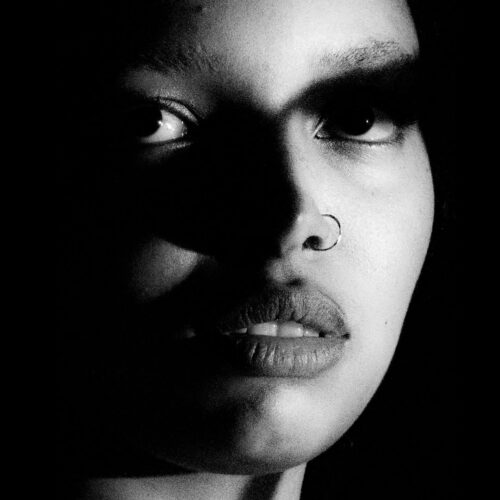“EVERYONE IS A STORYTELLER” – IN CONVERSATION WITH THE NARRATOR

MN: Welcome to Vienna, THE NARRATOR, you will perform Unsafe+Sounds Festival tonight at WUK Projektraum. How do you feel about that? And do you have any special feelings or rituals before performing?
TN: Yes, I have written out my stories top to bottom every single show. So, whether I know it by heart or not, I will write it down by hand, so it downloads into my body. Often that is such an isolating experience because it’s me versus my own world. Sometimes I don’t like that. Like, I’ll feel it again and just think, nope, we’re changing it. In real time, 10 minutes before the show, I have been one to change an entire idea, maybe because it doesn’t feel right to the space, atmosphere or people I’m about to meet or have met already. You already are influencing the show for me, and I let that happen. So, the ritual was really for the day to absorb. I absorb the day and let it influence me. I am grateful for my collective life is beautiful that I work with because we improvise so much. This approach allowed me to let go more than I ever could. It feels really encouraging at every point of life, even beyond music and beyond art. I’m constantly encouraging my body, before I begin, to let it in and to let it go.
MN: It makes a lot of sense to me when you say that you are absorbing the day. Being there when you had your soundcheck, I picked up that you’ll interact a lot with the audience during your show, also you told me that you never repeated a set, so maybe it needs this openness and letting in what comes at you?
TN: Yes.
MN: I feel like when you repeatedly play the same set, you might do the opposite and try to isolate yourself from all the influences in order to get into the right mindset. In contrast, you might need to let everything in to be prepared for anything that could happen, in a kind of immediate way.
TN: Exactly. Something recently happened that I really enjoyed, it was a few weeks ago. I was collecting the hums of people and there was a person who was quite drunk, and I sensed that they wouldn’t want to be highlighted. But I did go up to them and they started humming, but then they laughed, and it broke up. Since I had it looped it then became a percussive element. The laugh turned the entire show around and you can’t particularly predict that. You have no idea. But that person’s discomfort was exactly what we needed for the piece. Which I thought was great.
“I absorb the day and let it influence me.”
MN: And how do you go about this, like, when audience members feel uncomfortable in these moments? Does that happen often?
TN: *laughs* Oh, yeah. Oh, yeah. Of course.
MN: I suppose you mostly perform in London.
TN: Yeah, this is my first show as THE NARRATOR abroad. Thank you for having me. It’s really beautiful.
MN: Our pleasure! But I was wondering, because in my experience it’s not the most common practice for artists from Vienna to have a lot of crowd engagement and interactivity going on. However, I’ve seen many artists from for example London do it in really interesting ways. Yet I think it needs a lot of sensitivity and care from the performer to do it in a respectful way.
TN: Absolutely. Yeah. I believe that the intention shouldn’t be self-indulgent. If you start from an indulgent place to pull everyone into what you want to see all the time, then you’re going to feel resistance. I performed in a setting where it was really difficult to bring my energy and their energies together. I had to be like – am I going to accept this? Or am I going to create a war? You know? What would be reassuring for everyone in the room right now? It always comes back to language. What’s relatable? What do we all see together? How can we all return to basics? Basic senses. You know? That’s why I use a lot of, like, the voices. I love to channel with crowds. The screaming, the humming and the panting. Maybe you do it in private, maybe publicly, but those are basics. It’s not an acting class. We’re not trying to impress. It’s about finding if there’s a person who’s willing, then something magic will happen, you know?
MN: Yes, for sure. It is super important to be intentional with what you are doing and accept whatever contribution someone might have to give. It’s so interesting to me how artists but also crowds go about these things in different places and scenes.
TN: We had a show recently with DJ Spanish Fly, the godfather of Memphis rap. We booked him for a show in London and he performed, and it was amazing. He started off the show with: “Is there any birthdays tonight?” It’s like church in a way, there’s a person who reminds everyone we’re here to do this together. I love that. I love watching people who make it so centred that we’re here together and that this is not going to happen again.
MN: This acknowledgment of being here together reminds me of something Nkisi said during a panel discussion in the discourse programme of the festival. She talked about a concept called telempathy, a fusion of the words telepathy and empathy. This really resonated with me, and I think places where music happens can really engender this in us.
TN: Absolutely. Can you say that again, I’m going to write that down. That’s a strong feeling.
MN: T-E-L-E-M-P-A-T-H-Y… Trying to bridge your work and the overall theme of this years Unsafe+Sounds Festival, I wanted to read out a brief excerpt of the curatorial statement which says:
“Speculation, imagination, myth making, fantasy, memory, dreams, and fiction, the virtual sides of reality offer ways to alternate and altered states of consciousness and perception. Fiction is just a differently perceived form of reality, and it plays a crucial role in shaping it. Of many worlds, it’s not a call for escapism, but an invitation to encounter a kaleidoscopic crystalline world made out of many worlds.”
In my eyes this heavily resonates with your work, which is “exploring the healing power of sensory storytelling which delivers emotionally charged interactive experiences” and builds on transcending boundaries of time and human imagination, through sound and poetry. What do you think are the subversive potentials of storytelling in music and art? Big question, I know.
TN: *laughs* I’m always like, I’ve just been here 27 years, guys. The potentials is a huge word. Well, within everybody, I believe that there’s a radio and all your channels that are activated, that are coinciding and coexisting with reality, have the potential to show you different perspectives of everything. I mean, it’s like all these channels are on all the time, and you’re tuning constantly to access parts, features, places that are right in front of us and sometimes are hidden. When it comes to storytelling in music, it’s my favourite disguise because it is so explicit. But it makes you feel things that aren’t explicit. I want to know how that can change our realities quite intensely, you know? Because there’s so much that we don’t know how to say. And it allows us to tune our radios better. Sometimes that noise is good, just to feel this sensation and to trust that all of this is connected. Stories and music to me have been forever so isolated though and I’m really grateful that I have accepted that they’re not. When I was making music to begin with, I never saw the story in it. I always felt it was such a huge hill to climb, all the skills you had to acquire to be able to show and tell music. However, with stories I don’t necessarily think that anyone needs to have these skills. I think everyone is a storyteller. Everyone has an immense amount of language within them, and it just takes a little bit of tuning to be able to find it.

MN: And that differentiates it from music where some kind of technical knowledge or material access is required.
TN: Right, because for stories you only need access to yourself. It just needs you and maybe a mirror. And sometimes mirrors are people. Sometimes it’s just the conversation to hear your own, you know, to hear your internal landscape. And that’s cool.
MN: This also relates to the aspect of absorbing everything around you and the fight you mentioned that you are having with yourself. A story comes out of you, you absorb stuff, you change, and then again it’s a different perspective.
TN: A whole reaction. And I think with music, which has always been to me just to… *hears Artjom Astrov’s soundcheck* That sounds amazing, it sounds so beautiful. I think I just need more time on this earth with music. Because I’ve had more time with the story. But with music, I’m accepting that it’s not just there to pull up the story because I’ve always considered it as it’s there to make the story bigger, maybe more expansive or to fill in the colour. I want to respect that music is also a character. That’s why it’s really hard when you say the word soundscape… and people just go, oh, ambient, trance, that’s maybe something you might feel, but there’s so many elements. I think anyone who’s ever been outside in stillness, even when you’re hearing nature, there’s so many elements. It’s not just the ambiance. Outside, you hear these bugs, and you hear this crackle, all of these are characters to me. I’m trying to accept that it’s mimicking the world that we have outside, you know?
MN: If fiction, storytelling or even music is mimicking the world outside, how far do you think do they relate to “reality”, the “world outside”? Is there a distinction and if yes where would you distinguish between reality and fiction?
TN: Oh, we’re going into the journals now. We’re going to the feelings. Is there a distinction? I’m sure there is. I just haven’t embraced it as much as I think other people have. I feel that it is very similar to when you’re in an ocean and you can really feel it when you get to cold or warm spots. They are obviously the same ocean, nevertheless you can really feel that it’s a completely different place. If I was closing my eyes, I would literally feel that my body temperature has changed. I’m cold now or I’m warm now. I feel maybe it’s quite similar. Maybe reality in fiction is kind of like temperature change. It’s fluctuating, but we’re going by the same measurement. You know?
MN: What would the measurement be?
TN: This is what I’m here to do, to find out. I don’t know *laughs*. I think some people would say God. Others would say, you know, unconditional love. Maybe some people would say telempathy. I think the point is to experience the measurements. But mine fluctuate as well. I’ve found that my measurement for the last year has been accuracy. How accurate is reality in fiction? If we went through the last 9 months, what word have I said the most? I always ask myself, is it accurate? I’ve said accurate more than anything – is the world accurate? Is the gravity of this sensation accurate? Am I being accurate to myself and my feelings by honouring the accuracy? I feel like the measurement right now for me is, are reality and my imagination accurate? Are they allowing both of themselves to be? I’ve been trying to use it as a positive affirmation. Was that accurate in my body? Did that satiate me? And I don’t even think of it as having to be better or to be particularly great or mastery of.
MN: Do you feel accurate with where you’re at with your music right now?
TN: Yes, though I’m about to enter a new age. I’m aware that when I get to a new age – the same thing has always happened since I was a child – I am interested in acquiring something challenging and that is coming up in my music right now. Like I’d love to test and experiment more with instruments that I don’t have access to very much. The harp is on my mind, and I’ve just acquired a harmonica. I bought one here yesterday. Scout has a harmonica, Isaiah has a harmonica, and I’ll just use theirs, but I’ve never had my own. So, I went to the music shop here and got one and I felt like why not just take this into today’s show. I can feel those sensations, the shadow behind me: “You’re going to want to acquire a challenge.” I’m thinking about those things. I don’t really know or touch much of cables or buttons. I play the piano a lot and I just love to be touching physical things. It can make things immediate.
MN: Could you share something about your journey into music with us? What drew you to become a musician? You say you play the piano a lot. Was that the first instrument you played?
TN: The family that I grew up in was one where musical instruments were not present. That’s why instruments were always very fascinating. In school, we had xylophones and glockenspiels, I remember that very clearly. And how they felt so physical. I really love being able to touch the material of an instrument. However, my parents were ravers in the nineties. My mom loves house music and my father jungle and drum and bass. When I listen to jungle now, it feels very similar to if someone would have put on 480 hertz ambient. It relaxes me because I’ve heard it so young. It’s like a reset. It’s like having a cold shower. Though I grew up in Miami and I was around a lot of Cuban music and Latin influences, it was all about the body. Music has always been connected to dance for me. But through high school, I remember when I had a crush and I learned the guitar, because I was like: “I want to impress you.” I wasn’t good at it at all, but it was the first time I’m not dancing to something. I was trying to access the source, which was always difficult for me personally with music. Words allow me to express those internal landscapes. With music I have this vulnerability sometimes, that’s really difficult to merge, but where I’m at right now, I feel like that’s happening and the piano is definitely that.
MN: You are truly a multidisciplinary and multidimensional artist, your music has elements of poetry and spoken word in it, your projects THINGNESS VOL. 1 & MORTAL OIL OF THE SPOILED SPIRIT with Isaiah Hull are even categorized as “Sonicbooks”, you also paint and write poems separately from integrating them into your music. How do you go about these creative processes and are all these mediums separated in your head and you merge them throughout the artistic developments, or do they have an inseparable quality to them for you anyway?
TN: I have a lot of journals and the size of them matters, which is really particular, and I don’t know why. I have a pocket journal, that I always have with me when I’m travelling or on transit. So, this is my imagination for the day. I’ve decided that there need to be some kind of general structures that allow me to function. If we’re going into A4, which I was really intimidated by a lot of my life, Isaiah was a huge changing point for me because he loves A4. We did MORTAL OIL OF THE SPOILED SPIRIT strictly with A4, that was like a constant.
“We’re going to construct a world together, one we must arrive at through a series of transformations and evolutions.”
TN: When I’m creating, I try to create small tropospheres, basically spaces where weather changes. However, it’s also these tiny environments and ecosystems on the page in the journals, that give me access to those thoughts. Everything is everywhere, but at least it’s a map. For today’s show, I write: “We’re going to construct a world together, one we must arrive at through a series of transformations and evolutions.” This was my feeling of how I want to start tonight’s show, with everyone. What are those evolutions and transformations? First, you must be malleable, okay, malleability – what does that feel like physically? Shapes. The shapes of the body. To be a bird, you must have feathers. You must whistle. To be a wolf, you must howl. You have sharp teeth. You have fangs. These are shapes of the mouth. Now, I question all of this and write it down. Could I make a giant bird? I called Isaiah specifically for last night because I needed help to know if I could. Could I turn the room into a giant bird? He said yes yet had a lot of questions. How do you fly? How do you get to flying? Is there gravity involved? You must walk before you can run. What kind of bird are we becoming tonight? These are all the phrases that happen within. When we talked about gravity and how gravity can look within a different medium – that’s why I wanted all that paper. So, we can use the paper to create a giant bird. Are you seeing imagery?
MN: Yeah!
TN: I’m creating maps within the show. How to build the world? Accepting the rhythm. That’s why I like to do a lot of shows within silence because you cannot guess what noises people are going to make. There’s a natural rhythm within people. You can feel the anxiousness. You can feel again, we talked about discomfort, but I must hear that in silence. What do we sound like inside as people? Now we’re setting the rhythm. We’re accepting that we have this silence. Still, there’s the question of what’s the tempo of the night. Where are we going with this? Am I going to resolve any of this? Most times, yes. I just have to respect the troposphere, because when things do change and I have to improvise, I’m accepting the flow of troposphere and then we move with it.
“There’s a natural rhythm within people.”
MN: I find it really fascinating because before you said that the relation of fiction and reality is temperature change, and now we’re in the troposphere. Was that on your mind before already?
TN: *hits the table* Oh my gosh! It is.
MN: Accepting the troposphere, temperature change. And we had a huge temperature change today…
TN: Yes. Yes! I didn’t even see it until you said it. That’s really accuracy. To answer your question specifically, I do merge the processes throughout, I’d say. I hope walking you through that made more sense.
MN: Yeah, totally. It’s really interesting to see how everyone has such a different way of preparing for performing, and I love to get an insight.
TN: That’s great to hear. Before anything, like I said, no show is the same. I must go through these processes every single time, and it’s the most fun. As long as this gets to be this fun, I’m going to keep doing this.

MN: When you make music or produce music, try to record it, is that a similar, or a completely different process?
TN: I’ll be very specific here, only talking about THINGNESS VOL. 1 & MORTAL OIL OF THE SPOILED SPIRIT. With THINGNESS, when I was making it, it didn’t happen in any kind of linear experience. It was like a collection of features which spanned over a period of four years. It needed an element of pressure. Luckily this amazing artist, Psychedelic Ensemble, invited me to do a guest mix for his show on NTS. When it came to this deadline, everything just began to click, and all these songs and stories found a home. I could have obviously just put a bunch of songs together, and it would have gone on the radio. But Anton, who I work with a lot, who I worked with on THINGNESS – I called him the architect – he would have the language for something that wasn’t really clear to me. For instance, the sounds for EVERYTHING MAN, I said I don’t want to use horns. What sound like horns? Elephants. So, we used elephants. Elephants are horns now. We began to build our inventory through things that were outside of music. That was mostly what THINGNESS was. How do we have a musical experience outside of music? The natural world was really involved in that.
MN: Did you do a lot of field recordings then?
TN: Well, so much of it was voice notes. That has been the biggest, greatest blessing to be able to voice note the world. I was on tour last year and I’d be in Germany playing an organ, so I voice-noted it, then we’re extracting and now placing it into these worlds, and it has a home now. It was the perfect representation of everything I had experienced for those 4 years and this character of THE NARRATOR is meant to guide you through all of this.
“You’re going to see a lot of demons.”
MN: Holding everything together.
TN: Right. I just really leaned into that. I also had to finish it on my own because there were so many things going on in my imagination. I needed to go into that separate silence. So, I went to Lisbon to finish THINGNESS, on my own. I broke myself in a way. You’re just with yourself and everything that you want is going to come out and you’re going to see a lot of demons. You’re going to see a lot of anger and you’re going to see a lot of disappointment. Nevertheless, you’re going to have to go through it. I had to do a lot of accepting. I was losing my mind because there was just so much that I wanted to put down. I’m really grateful that it completed itself – though there’s also two more volumes to come.
MN: Oh wow! Can’t wait to listen. How did you go about MORTAL OIL OF THE SPOILED SPIRIT with Isaiah Hull?
TN: It was an incredible experience. Isaiah’s mind is very fast, not even fast as in we did things fast. We didn’t do things fast at all. He allows whatever is inside to come up very fast. He’s very much like, I’m just going to allow that to happen right now. It was an amazing communion because we both are writers. So, words were really the third person in the room. It was the most fun I’ve had with someone collaboratively because he is someone who respects language so deeply. I produced the whole thing, which was also my first time for such a long project. There was so much play. We were seeing these small threads out of which these huge worlds formed.
MN: And then suddenly you’re in an airplane.
TN: And then suddenly you’re in an airplane. The funniest thing about it, in a lot of the stories the last word takes you into the next. When you end the first story, CLUB INFERNO, Isaiah goes: “Oh, there’s something above you”, and then it’s into STARRY NIGHT and there’s stars above you. It was so much fun because you could just keep going. It could have been never-ending.
MN: I remember listening to it properly for the first time. Well, I feel like we listen to so much music all the time and I’m following many releases, combined with DJing in clubs and making radio mixes you kind of have to always quickly judge when going through music, is this “worth” my time right now? But with both, THINGNESS and MORTAL I started listening to it and knew that I wanted to listen to it in an intentional way and give it the attention it deserves. So, I had to be in the right headspace and when I was and put it on, I could really dive into the stories. I appreciated it a lot!
TN: Oh, goodness, yes. It was so funny to hear where people have listened to it, and how maybe it’s sometimes not the right place. I had a friend who was listening to it on a plane, and it was just too much, too intense, you know? I also had an Uber driver put it on because they were interested in what I create. Then it was a part with a door knock and angels in a car, that was quite overwhelming, since these things are happening in real time as reality is happening. Which brings us back to question of merging. Do you want reality and fiction to merge? That’s up to the listener. If you’re ready, come inside!
MN: I still wanted to ask you about life is beautiful.
TN: Oh, my family.
MN: Can you share some of your thoughts and experiences with it in the context of collaboration, friendship and the London scene?
TN: We’re eight artists in the collective and everyone is so, so fascinating. It’s such a special feeling to be able to work and be inspired by people that you love as people. We all come from incredibly different backgrounds though. aloisius is the founder of the collective. I always bring this up because his vision kind of out-visioned us. He was so dogmatic about wanting all of us to come together, to really experience something unique. He had this huge idea, but we were all super sceptical in the beginning. You know, in London there’s obviously so many subcultures, but within this, so many of us are struggling. We’re all very broke and very frustrated with how much is being taken from us. All the clubs, all the venues, there’s no real stability. So, the idea of the collective was beautiful, but we were all quite hesitant. Luckily he was super patient. After a while we then became patient with each other. All of us allowed this unknown to wash over and it paid off. Whenever we would perform together, something magic would happen, like a portal would open. I can’t fully describe the sensation. However, that allowed us to give proof to magic. Life is beautiful, maybe. Then we all kind of got on board.
We had a lot of discussions surrounding the phrase “life is beautiful”, because obviously it’s ugly too. Therefore, we always need to find a way to translate it into this incredible world, ground it. When we are preparing for a show, we have to see each other on different channels, since it’s really difficult to get eight people together in a room. We found different combinations and working processes, that allowed us to get stronger as a unit. On top of that, we allowed improvisation to become the central piece, and this is only possible because we are all practicing trust so much, in our individual times and combinations. I love them. Honestly, they’ve changed my whole life.
It’s all about play. If we’re not having fun, we immediately ask ourselves how do we have more fun? One essential thing we do is talk on stage. It’s never about the secrecy with us. If something isn’t working, we address it. For example, if aloisius is playing the drums and no one can hear anything, I’m like, “Stop! Pick up the cello”. When you are improvising, to us it’s important to disclose the process of what is happening.
MN: I would love to see you all perform live together!
“To give proof to magic”
TN: Please! You’re invited whenever! You have to experience it live. That’s the thing, we have so many things that we’ve created together through voice notes mostly. Like, a lot of our recordings are just the live shows or us being in different combinations of each other, and we’re just recording it. We haven’t gone into the studio as a group at all ever. All the material and output, it’s just there and we let it be. Yeah, and I have the symbol tattooed on my back, can you see it?
MN: Yes, that’s so cute! So, you’re all embracing it?
TN: To the fullest.
MN: My last question would be if there’s anything that you can already tease that is up next?
TN: I have a project that’s out in November. A completely separate thing, called The Radioweavers Raw Technicolor. I’m going to share some of the music tonight.
MN: Can’t wait. Thank you so much for your time!
TN: Thank you.

This article is brought to you by Struma+Iodine as part of the EM GUIDE project – an initiative dedicated to empowering independent music magazines and strengthening the underground music scene in Europe. Read more about the project at emgui.de.
Funded by the European Union. Views and opinions expressed are, however, those of the author(s) only and do not necessarily reflect those of the European Union (EU) or the European Education and Culture Executive Agency (EACEA). Neither the EU nor EACEA can be held responsible for them.


The Narrator